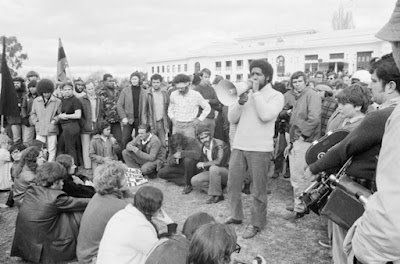2021 saw the lowest number of posts on this blog since it began. That downturn is reflected across across all my writing. It's not just covid, although that has been a very major factor.
One of the most difficult things about this pandemic has been the uncertainty, uncertainty accentuated by constant shifts in rules and regulations and in advice further compounded by lack of transparency. Now I feel that the wheels have come off in no uncertain fashion. Covid cases have exploded, testing systems are collapsing, our health staff at all levels are exhausted, contact tracing is overwhelmed, the need for workers to quarantine has affected production at all levels, the pressures are forcing daily changes in the interacting rules between jurisdictions, while jurisdictions have stopped providing information that we used to rely on. .
I need to write a proper policy piece on all this. For the moment, I want to make a few short comments from a personal perspective.
The decision by the new NSW Premier Dominic Perrottet to abolish restrictions in NSW in a single swoop rather than a more staged testing way has been an unmitigated disaster, one that has actually had the opposite effects that he intended. Life including economic activity has actually become more difficult, not easier. It's not all his fault. The now abolished Queensland requirement that people must undergo PCR tests before entering Queensland added something like a third to the load of an already overstretched NSW testing system, while decisions at Federal level that rendered the supply of booster shots unprofitable for GPs and pharmacies reduced supply availability just at the time that rule changes increased demand.
Both Premier Perrottet and Prime Minister Morrison talk about individual responsibility. In fact, the interacting changes have had the opposite effect.
I visited one of the local shopping centres the day that both masks and QR code registration ceased to be mandatory. Less than 10% of customers, perhaps 20% of staff, had masks on. I think that people just suddenly relaxed. As covid cases spread across Northern NSW including Armidale, mask wearing came back before it and QR check-ins became mandatory once more.
The spread in cases coincided with changes to the information provided by NSW Health and by Hunter New England Health. Information on cases is now restricted to local government areas, while the previous venue information is no longer provided. Instead, we are meant to rely on notifications from Service NSW to warn us, notifications that have struggled as the contact tracing system came under increasing strain.
I have received one such notification informing me that on 13 December I had signed into Tamworth Base Hospital on or around the same time as a covid infected person and that I should monitor for symptoms and get tested if they emerged.. Oddly, I was visiting someone in Tamworth sitting by their bed when I received the notification. Because I hadn't seen it before, I asked the doctors who were present about the notice. We discussed it briefly. Later they actually came back to see me to find out more since they had not heard about the case, but by then I had driven back to Armidale.
The next day when I drove to Tamworth I was not allowed to enter the hospital because a code red had been declared across all NSW hospitals barring visitors, so I drove back to Armidale. I was annoyed. Apparently, it had come into effect at 5pm the night before, but communications about the matter had been poor among staff and patients. Patients had not been told, so could not alert visitors. This was happening as the mask/QR rules were relaxed. Later, a code yellow was apparently declared as the hospital struggled to manage the combined effects of covid and other workload. This included at least one covid case among staff in the ward I had been visiting. All patients were covid tested, while staff were forced into full protective equipment.
I have not needed to have a covid test myself, which is just as well since PCR testing facilities were limited over the Christmas break, while delays in getting results increased We have all been told to use home based rapid antigen tests (RAT) in place of or in combination with PCR tests. This came as PCR tests including those mandated by Queensland for entry to the state (negative test no later than 72 hours before entry, adding about a third to the NSW testing load) buckled. The replacement of RAT tests for PCR had the inevitable effect of exploding demand for RAT tests that could not be met from available supply. Many of the FB groups that I am a member of and not just in Armidale have been full of requests for information about availability of both PCR and RAT tests not just for people who want to travel but also to meet occupational requirements and health concerns.
As an aside, and this bears upon the question of individual responsibility, youngest and her partner live in Lake Macquarie where case numbers are relatively high, while Adrian runs a cellar door that has stayed open. They both visited Sydney for Christmas, while Clare visited me after Christmas. They were able to obtain supplies of RAT tests earlier in December and have used them, for example, to test before going to Sydney and after coming home. That is a case of individual responsibility, but you can only do it if you have access to the tests and can afford to buy them. PCR tests are free, but RAT tests have to be purchased.
Much stress is now being placed upon booster shots. My second shot was 19 July. When the time requirement for booster shots was cut from six to five months, I became eligible for a booster on 19 December. However, the time requirement for boosters was then cut further from five to four months with a further cut to three months to come in later, Meantime, vaccination for kids aged 5-11 comes into effect from January. So we have a very large boost in demand, Vaccines are available, but the logistics of actually getting them to people has become a real issue. I was not able to get my booster shot before Christmas and will now have to scrabble to find a place with some places not taking bookings until early February.
I am very happy to take individual responsibility, but it's hard to do so when information is restricted, when PCR tests are under strain, when RAT tests are expensive or not available and the availability of boosters uncertain. My mood was not helped by NSW Health Minister Brad Hazzard's comment that we all had to accept that we were all going to get the omicron variant. Thank you. /























